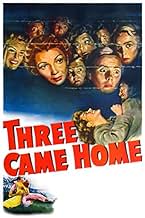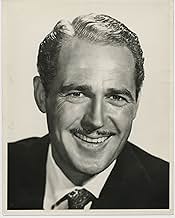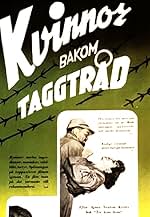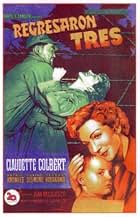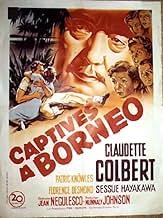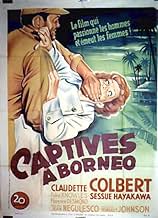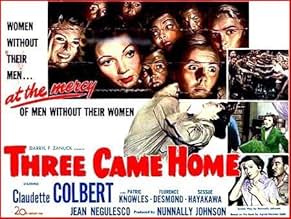Agrega una trama en tu idiomaDuring Word War II, American author Agnes Newton Keith is imprisoned by the Japanese in various POW camps in North Borneo and Sarawak.During Word War II, American author Agnes Newton Keith is imprisoned by the Japanese in various POW camps in North Borneo and Sarawak.During Word War II, American author Agnes Newton Keith is imprisoned by the Japanese in various POW camps in North Borneo and Sarawak.
- Dirección
- Guionistas
- Elenco
- Premios
- 3 premios ganados y 1 nominación en total
- Elderly Resident
- (sin créditos)
- English Girl
- (sin créditos)
- English Radio Announcer
- (sin créditos)
- English Radio Announcer
- (sin créditos)
- Japanese Soldier
- (sin créditos)
- Woman Prisoner
- (sin créditos)
- Englishman
- (sin créditos)
- Dr. Bandy
- (sin créditos)
- Japanese Soldier
- (sin créditos)
- Dirección
- Guionistas
- Todo el elenco y el equipo
- Producción, taquilla y más en IMDbPro
Opiniones destacadas
Considering that this film was released only five years after the end of World War II, when anti-Japanese feeling was still very much present in the U.S., it's surprising that the horrors of life in Japanese captivity aren't played up more. Several instances of casual and calculated brutality are shown, but there is little here to compare with the shocking (and realistic) scenes in the much more recent film "Paradise Road." And the range of characterizations among the Japanese should be a welcome surprise to those who dismiss wartime and postwar American attitudes as uniformly jingoistic and racist. Yes, some of the Japanese are wantonly cruel, but others are obviously sympathetic to the prisoners, and as noted above, Col. Suga emerges not only as a reasonable commander but also as a noble man who can resist the temptation to take out his own grief and anger on the prisoners. Sadly, there were few men like Col. Suga in the real Borneo camps.
One unfortunate oversight: the action of the film covers almost four years of imprisonment and deprivation, but the prisoners appear just about as well-fed and energetic at the end as when they arrived.
Interesting and strong drama based on an autobiographical book by Agnes Newton-Keith , being perfectly adapted by Nunnally Johnson . No weakest in the cast and few in the movie , which presents the women's Japanese captors as human and inhuman at the same time with clashing cultures included . Clearly there's much longer plot in this, but director Jean Negulesco concentrates on the passionate acting of Colbert . It's a taut psychological drama about physical and emotional survival focusing on the tensions between Claudette Colbert , soldiers and camp commander well played by Sessue Hayakawa as cultured officer. Crammed with emotive moments , the picture has a string of committed performances from Colbert , Knowles , Desmond and Hayakawa . Familiar ground is trod in this prisoner-of-war saga , but the thought-provoking story and magnificent acting help sustain interest. This superior though overlooked drama , is also laudable for a fairly portrayal of the enemy captors and being masterfully directed by Jean Negulesco. Rating : Above average , worthwhile watching .
Other film about women on concentration camps mistreated by Japanese military during WWII are the following : ¨Women on valor¨(1986) by Buzz Kulik with Susan Sarandon , Kristy McNichol and Alberta Watson set in Philippines and ¨Paradise road¨(1997) by Bruce Beresford with Glenn Close , Julianna Margulies and Frances McDormand , set in Singapur.
¿Sabías que…?
- TriviaAgnes Newton Keith, the writer of the book on which this film was based, wrote a letter about the film and its critical response. The letter was published in 'The New York Times' on 26 March 1950. It reads: "...I find that one or two critics (not 'The New York Times') question why the story was written....I wrote 'Three Came Home' for three reasons: For horror of war. I want others to shudder with me at it. For affection of my husband. When war nearly killed me, knowledge of our love kept me alive. And for a reminder to my son. I fought one war for him in prison camp. He survives because of me....The Japanese in 'Three Came Home' are as war made them, not as God did, and the same is true of the rest of us."
- ErroresColonel Suga says he attended the University of Washington for four years and Agnes reveals that she attended Berkeley. Suga goes on to say that Cal "murdered" Washington's football team. However, Tatsugi Suga arrived at Washington in 1924 and during the next four seasons California never defeated Washington. Only one football game would fit Suga's description: a 33-0 loss in 1933.
- Citas
[first lines]
Agnes Newton Keith: Six-degrees north of the Equator, in the heart of the East Indies, lies Sandakan, the tiny capital of British North Borneo. In Sandakan in 1941, there were 15 thousand Asiatics, 79 Europeans, and 1 American. I was the American. My name is Agnes Keith. I was born in Oak Park, Illinois, and graduated from the University of California at Berkeley. My husband is Harry Keith, a colonial official of British North Borneo. Borneo became my home when Harry and I were married. And it was in Sandakan that I bore one child, and lost another. And it was in Sandakan that we waited - 45 white men, 24 wives, and 11 children - through the anxious days of 1940 and '41. Certain only of one thing: that sooner or later, Japanese guns would join in the thunders of war, and Japanese troops would come down through the East Indies. The men waited because it was their duty; the women because it was their choice.
- ConexionesEdited into Your Afternoon Movie: Three Came Home (2023)
- Bandas sonorasYou Say the Sweetest Things (Baby)
(uncredited)
Music by Harry Warren
Played on the radio before and after the news flash regarding Pearl Harbor
Selecciones populares
- How long is Three Came Home?Con tecnología de Alexa
Detalles
Taquilla
- Total en EE. UU. y Canadá
- USD 1,900,000
- Tiempo de ejecución
- 1h 46min(106 min)
- Color
- Relación de aspecto
- 1.37 : 1

